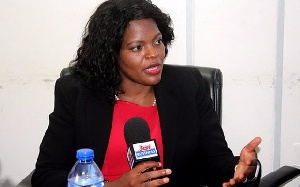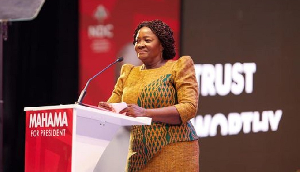Business News of Monday, 22 May 2017
Source: classfmonline.com
Dumsor hit Vodafone Ghana badly - CEO
CEO of Vodafone Ghana Yolanda Zoleka Cuba has said the erratic power situation which persisted in the country until recently cost the telecom company a lot.
Ms Cuba, who was made CEO on 1 May 2016 told Accra-based Citi FM in an interview that: “It was really difficult,” operating within the dumsor period.
“In reality, all cells actually work on electricity, so, if there is no electricity, it actually interrupts the quality of service that we can provide to our customers and that is the essence of the story.
“… More than that, it also impacted on how we allocate our budget. So, instead of saying we are going to build more south sites, we ended up having to invest in generators. And then it actually increased our operating cost because now you actually have to run on diesel so the ongoing cost of diesel has been going on even now,” she said.
“Unfortunately,” she added, “you can’t switch of generators because you don’t know when there will be power instability like we saw about a week ago. We actually had our generators luckily so we are not as badly impacted but it always impacts.”
She said “eighteen months ago, we spent most probably in the region of about 12-18% of our total cost on power related issues,” adding that the power crisis “actually negatively impacted our consumers.”
She explained: “Obviously, the first thing is that your consumers cannot charge their phones. So we actually told consumers to get these ‘Double Decker’ phones that they could use for three days at a time so whenever they had power, they had to make sure they charge and that sort of bridges consumption and that actually does not help the industry and does not make the industry more sustainable over the long period of time.
“So, what we actually did is we had spent a long time actually educating the consumer on how to be confidently connected, how to actually consume throughout the day, and then we see consumption changing somewhat because people actually had to charge when they had power and talk when they have power so those kind of things actually impacted from the consumer perspective. But from our side as well what ended up happening is we couldn’t get generators for all sides at the same time. And everyone was trying to get generators into the country so you actually had to prioritise your load. So obviously that impairs customers negatively from a quality and reliability of service. Because for me at the end of the day, it’s when someone is trying to call an ambulance, when someone is calling a loved one for a favour and the service is not there at the time that is when you really feel the nuisance factor. It’s much better now. I must be honest even with what happened a week ago, I didn’t feel it was severe although it was a national blackout but because we actually had some infrastructure , it actually helped as well,” Ms Cuba noted.
Entertainment










